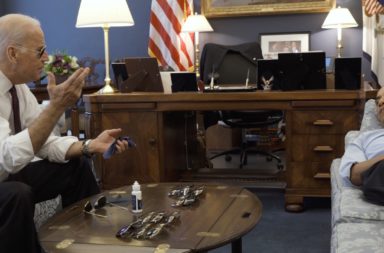No matter how you spin it, the report from State Department Inspector General Steve Linick is bad news for Hillary Clinton.
All the major federal departments have inspector generals that act as both internal and independent watchdogs. So the conclusions should be taken as the official word of the department that Clinton led for President Barack Obama’s first term as Secretary of State, and the conclusions about her decision to use a personal email server instead of the State Department’s are a major setback.
As a very brief refresher, Clinton used a server in her New York State home to conduct official State Department business, which is controversial because it raises major security and transparency concerns. A private server is going to be more vulnerable to cyber attack, the thinking goes, and emails that would normally be subject to federal open-records law will be harder to obtain.
Clinton justified using the personal email as a matter of convenience and at the request of the State Department turned over some 55,000 emails from her time there, though critics doubt how she could have possibly done this comprehensively.
The report from the Inspector General largely justifies those concerns. Here’s what you should know about the conclusions and the aftermath.
1. Clinton can no longer plausibly claim that the State Department was OK with her email setup
Clinton went as far as saying the State Department “allowed” her to use a private email account, but the report “found no evidence that staff in the Office of the Legal Adviser reviewed or approved Secretary Clinton’s personal system.”
You can try to argue the semantics of the word “allowed,” but that is a damning statement that makes clear State never approved her decision, nor did she ever run the decision through the proper channels.
2. The State Department thinks the private server posed major security risks and broke Department open-records policies
By the time Clinton was serving as secretary of state the Department had updated security policies to say that conducting official business through a private account posed “significant security risks,” making her use of it a violation of official policy.
It’s not clear, though, why State didn’t insist upon her changing. The report says that Clinton “never demonstrated to [Department officials] that her private server or mobile device met minimum information security requirements.”
Additionally, the Department criticized Clinton’s record keeping. Clinton previously argued that emails were saved because they were preserved in the government accounts of people she was communicating with, but State declared that “not an appropriate method.” And Clinton “should have surrendered all emails dealing with Department business before leaving government service,” which means “she did not comply with the Department’s policies.” She surrendered about 30,000 emails years after leaving State and only when pressed to do so to comply with a congressional investigation.
3. There were at least two hacking attempts
No, they were not successful – at least according to a Clinton staffer – but they definitely happened. The report found two instances from the same day in January of 2011 in which the technical-support advisor who was running Clinton’s email server had to shut it down because “someone was trying to hack us,” as he put it in an email.
Conservative media is especially up in arms over this particular revelation.
4. Lower-level State staffers brought up their security concerns but were basically told to be quiet
Both were employees in State’s office of information management talking to their director. One was concerned that the server would not satisfy federal record-keeping laws.
The report doesn’t mention whether the other staffer had the same concern, but one reported being told “never to speak of the Secretary’s personal email system again” and the other reported being told that the “matter was not to be discussed any further.”
5. The true reason Clinton used a private email account is also the one everyone assumed in the first place
Clinton originally talked about the inconvenience of using two different email accounts for personal and public business, necessitating two phones. But in 2010, more than a year after she had started at State, a top deputy suggested to her that she start an official Department email address so messages from her private account to officials did not end up as spam.
Clinton declined, saying she did not want “any risk of the personal being accessible.”
Her critics would likely point out another possible reason – to give herself an extra layer of protection from public scrutiny, which is certainly possible – but wanting to keep her active private life separate is likely a key reason as well.
6. The report suggests Clinton’s argument that past secretaries of state did the same is not quite valid
Clinton has argued that past Secretaries of State also used personal accounts – an argument that Politifact, for one, has rated “mostly false” – but the report says the circumstances for Clinton were different.
After Colin Powell’s tenure during George W. Bush’s first term, the report states, the Department revised its policies and issued memos “discussing the obligation to use Department systems in most circumstances and identifying the risks of not doing so. Secretary Clinton’s cybersecurity practices accordingly must be evaluated in light of these more comprehensive directives.”
7. Clinton misled the public
At this point in the list, this should be somewhat obvious, but it’s worth stating. She said the State Department allowed her to use a private email server, but they emphatically did not. She also said her server had “robust protections,” but if that’s true it was never verified by the State Department itself, and that is a problem.
As even mainstream hosts like Chuck Todd are putting it, “you sort of pull muscles watching [the Clintons] try to spin this,” which they continue trying to do.
8. The report further undermines Clinton in a significant way
It’s already widely reported that Clinton and Trump are the least-liked standard bearers in modern U.S. history. Both are also considered dishonest. Sixty-four percent of voters in a recent New York Times-CBS poll said neither was “honest and trustworthy.”
For Trump that’s not so surprising – the man is an eternal spring of falsehoods, exaggerations, and flip-flops. Yet Clinton is viewed with near-equal suspicion despite actually campaigning in the world of reality. That lack of trust is a huge problem that only gets worst with reports like this.
9. Donald Trump is going to make this a central issue in the campaign
It’s no coincidence that Trump repeated the nickname “Crooked Hillary” repeatedly in a rally in Anaheim, California just the other day. He is expert in turning vulnerabilities into caricatures, and he will relentlessly remind voters about what this scandal represents to them: dishonesty, and a sense that the rules don’t apply to Hillary Clinton.
10. The FBI inquiry is also expected soon
Remember that the FBI is separately investigating Clinton exposed classified information in her emails, and that investigation is expected to wrap up soon with a likely interview of Clinton herself, according to the Chicago Tribune.
National security experts have repeatedly said they don’t expect a criminal indictment. But getting this final part of the issue behind her is absolutely critical for her campaign, which has taken on the joylessness of a “Bataan Death March,” one White House official anonymously told Politico.
Image:






